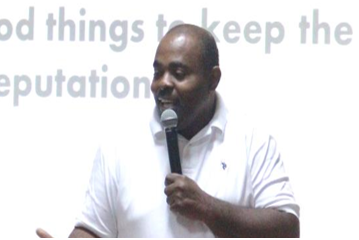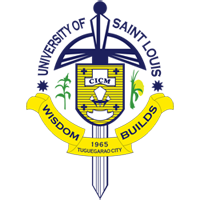

Captivating, child-like, and a witty recollection facilitator, Rev. Fr. Didier Badianga, CICM, allured the hearts of USL employees during the Pre-opening Recollection last June 10, 2016 with the theme: “Revisiting our CICM/ Louisian Missionary Identity,” at the Bulwagang Teodulfo Domingo.
Fr. Badianga reminded that we are created in the image of God, that we became His adopted children through baptism, and that we are given a mission.
Education is a mission
The recollection facilitator pointed out that education is a mission, mentioning Pope Francis’ statement on the languages of education: Language of the Head, of the Heart, and of the Hands. “Education must go forward by these three ways: instructing in how to think, helping students to feel well; accompanying students as they do [what they have learned or are learning to do],” Fr. Badianga quoted Pope Francis.
Further quoting the Pope, “The three languages must be in harmony so that students think (about) what they feel and do; feel what they think and make; and they do what they think and feel.”
Fr. Badianga stressed that education should not be considered purely as utilitarian as to simply impart information or provide training in skills for economic benefit. According to him, education is forming the human person; thus, it is about imparting wisdom. The recollection facilitator further stressed that true wisdom is inseparable from the knowledge of the Creator.
Given a mission, educators are described as role models, icons of goodness, salt of the earth, and light of the world.
Challenges and inspiration
Actions can either be good or bad but there is no such thing as ‘’bad’’ people, only ‘’less good,’’ said Fr. Badianga. “See and find out what is good in others,” this was his conviction affirming the innate goodness in man, that even though at times can commit bad actions, is still worthy to be given a chance to repent, renew and convert to his full goodness.
Reflecting on today’s world, the recollection facilitator presented common challenges such as lack of personal commitment (fear of a lifelong commitment), individualism (trend of being independent and self reliant), expertism (trend of being expert to make a name), and lack of credibility (lack of personal relationship with God) which taint one’s goodness and hinder the person in carrying out his/her mission. The challenge given to us is to be inspired and be guided by the Gospel values, which are needed in the journey towards discipleship. “God is stronger,” affirmed Fr. Badianga that he repeatedly asked the audience to complete the line “God is,” with the audience answering “stronger.”
The Gospel values
The following Gospel values were thus emphasized: love instead of hatred, forgiveness instead of vengeance, non-violence instead of violence, unity instead of division, generosity and service instead of selfishness, faithfulness instead of betrayal, chastity instead of promiscuity, and honesty instead of dishonesty.
It was also emphasized that a teacher is like a candle that burns to give light while it consumes itself. Jesus, himself, was a teacher. He invited his disciples to follow Him and not to stay with Him. Disciples are to be committed to His mission and His destiny.
Accordingly, there are three aspects of discipleship: personal commitment to Jesus; following Jesus; and making disciples.
In bringing Jesus to others, Fr. Badianga discussed, we become well known people or public figure (person), which can bring advantages – for example, self discipline; and disadvantages – for example, doing what people expect from you just to please them. Thus, the world needs more witnesses than preachers.
Community is mission
The recollection facilitator elaborated on rootedness in Christ, as essential for true discipleship, and interconnectedness. “We don’t flourish individually but as a community.”
Community is itself mission, asserted Fr. Badianga. He further said that communion brings about new discoveries. Communion with our brothers and sisters leads to self-knowledge. We understand someone when we know him/ her better. When we understand people, we also discover ourselves. Communion thus further results in charity, patience and love.
The CICM/Louisian missionary identity
Still anchoring on his topic on mission, the recollection facilitator said that we are called to holiness, describing further the vocation of every man and woman. Just like the saints, Saint Louis in particular, and Fr. Theophile Verbist, the Congregation of the Immaculate Heart of Mary or Congregatio Immaculati Cordis Mariae (CICM) founder, we can respond to God’s call to holiness by first leaving something behind so we can open ourselves to a bigger group.
Fr. Badianga inspired the audience with the CICM mission which concerns God’s kingdom and the transformation of the world. CICM members leave countries, culture, and enter into the life and culture of others – the so-called ad extra character of the CICM. Mission is self-giving.
“Receive freely, give freely…Do not count your sacrifices; see the joy you bring to people through your sacrifices,” the CICM missionary said.
Other lines left by Fr. Badianga to the audience are as follows: “You are the channel of blessings, not channel of hurts or wounds;” “You must decrease and others should increase;” and “When you were born, people were laughing while you were crying – So now live in a way that when you die, you will be laughing while others will be crying.”
Living out the CICM/Louisian missionary identity entitled to us in our educational apostolate in the classrooms, in the Church, and in the society where the Lord pleases to send us, our world can become a community where peace, love, unity, and justice will be a reality.

